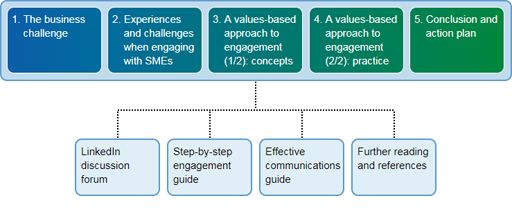Course overview
Welcome to Promoting sustainability in business: a values-based toolkit. This short course will give you a thorough introduction to a new approach to engaging with businesses on climate change and other environmental issues. It can help you overcome some of the more common challenges by connecting more readily with the values and language used by particular business owners and managers. The course works alongside conventional, technical discussions to promote deeper engagement with environmental issues and deliver more cost-effective and lasting outcomes. It also sets out the key research evidence, provides realistic, case-based illustrations and includes a practical toolkit that you can adapt for your own purposes.
The course has been developed by a multidisciplinary project team, including specialists in energy, environmental management, small business, innovation and communication. It was co-created with a group of business advisors, owners and managers, many of whom are featured in the learning activities.
Who is the course for?
This course for anyone working with, or within, small and medium-sized enterprises and seeking to improve their environmental performance. For example, you may be a business advisor or external consultant working for a Local Enterprise Partnership, someone operating in-house as an environmental champion, or perhaps a managing director trying to persuade your fellow directors to make a change. It will also be of interest to policymakers working in this area. While the course makes particular reference to SMEs, climate change and the transition to a low carbon economy, the approach outlined here can be also be applied to larger organisations, and to other types of corporate environmental and social responsibility.
Why study this course?
Most business advisors want to make a lasting difference to the environmental impact of SMEs. However, they often find that the only way to get the attention of busy owners and managers is by promising short-term economic returns. This can be frustrating for the advisor, who is unable to get into a deeper conversation about the environmental benefits of making a particular investment or change in work practices. There is also evidence that pro-environmental behaviour change is often fleeting and shallow if it is only prompted by financial factors.
Practitioners are often well aware of the importance of values, but there is evidence that many find it difficult to put their awareness into practice, particularly in the context of performance targets, budget constraints, and business clients with many competing priorities. This course introduces a simple and effective toolkit to help you bring a values-based perspective into your interactions with business owners and managers.
The course is grounded in extensive research evidence and ‘real-world’ experience. It does not claim to offer a ‘silver bullet’ solution to the challenges of engaging with businesses, or provide any advice on the more specialist, technical aspects of environmental improvement. Instead, it draws together some tried and tested ideas in the form of a practical toolkit on values-based engagement, coupled with a carefully structured set of learning activities that allow you hear from other practitioners, reflect on the conceptual and practical issues and develop an approach that fits with your own situation.
Course structure
This online course consists of five sessions, plus references, and a set of resources that you can download. The core resource is a practical toolkit to support values-based engagement. The toolkit has been co-developed with practitioners to ensure that it is practical, relevant and adaptable to a range of settings. Having completed the course, you will have a thorough understanding of the toolkit and will be ready to deploy it in your own situation.
The sessions comprise a brief introduction, followed by a learning activity. In most cases, these activities include interviews with workshop participants. You will be able to make your own notes as you work through these activities and use them for future reference.
At the end of each session there is a summary, action points and an opportunity to complete a short quiz to check and reinforce your learning. Having completed the quizzes and activities, you will be able to obtain a statement of participation [Tip: hold Ctrl and click a link to open it in a new tab. (Hide tip)] , which can be retained as evidence of your learning.
The authoring team
| Sam Hampton is a business advisor specialising in supporting SMEs to reduce their environmental impact. He currently holds a role with a Local Enterprise Partnership (OxLEP Business) supporting businesses throughout Oxfordshire to minimise their energy usage and to take advantage of the opportunities of the transition to a low carbon economy. He has also conducted research on energy policy, SMEs and the role of intermediaries at Oxford University’s Environmental Change Institute. | |
| Richard Blundel is a researcher and educator based at The Open University, with a particular interest in the links between entrepreneurial activity, innovation and environmental sustainability. He has contributed to Open University modules on entrepreneurship and innovation, edited a monthly survey of small businesses and published a number of articles and book chapters on related topics. He is also co-author of the textbooks, Exploring Entrepreneurship, 2nd edition (Sage, 2017) and Effective Organisational Communication, 4th edition (Pearson, 2013). | |
| Chris Shaw is an interdisciplinary researcher with over fifteen years’ experience researching climate policy and climate communications. He has delivered a number of innovative projects with organisations such as the Scottish Government, the IPCC, WWF and the World Bank. Chris is a Senior Researcher at Climate Outreach, an Associate of the Tyndall Centre for Climate Change Research and a member of the faculty at the School of Business, Management and Economics at the University of Sussex. His book, The Two Degrees Dangerous Limit for Climate Change: Public Understanding and Decision Making (Routledge, 2016) was shortlisted for the 2016 Philip Abrams Memorial Prize. | |
| Tina Fawcett is a senior researcher at the Environmental Change Institute, University of Oxford. Her research concerns energy use by households and organisations, and uses a multidisciplinary approach to understand current patterns of use and to identify opportunities and policies for reducing energy use and carbon emissions. Tina is leading the ‘policy and governance’ theme in the newly created Centre for Research on Energy Demand Solutions (CREDS). She is also researching decision making in SMEs, how firms engage with energy, and the multiple benefits of energy efficiency for businesses. |
The course team would like to acknowledge the following for their specialist advice, support and suggestions:
Partner organisations
Climate Outreach are Europe’s leading climate change communicators, bridging the gap between research and practice. Their mission is to ensure that climate change and its impacts are understood, accepted and acted upon across the breadth of society, creating a truly sustainable future.
Oxfordshire Business Support (OBS) is the Growth Hub for Oxfordshire provided through the Oxfordshire Local Enterprise Partnership (OxLEP).
Advisory panel
Fergus Lyon is Deputy Director of the ESRC Centre for the Understanding of Sustainable Prosperity (CUSP) and Professor of Enterprise and Organisations in the Centre for Enterprise and Economic Development Research (CEEDR), Middlesex University.
Anja Schaefer is a Senior Lecturer in Marketing in the School of Business at Maynooth University, Ireland and a Visiting Research Fellow at The Open University Business School. She is an experienced researcher and educator, specialising in corporate sustainability and business ethics.
Sarah Williams is an experienced business consultant and still works closely with regional businesses and members of Bedfordshire Green Business Network (GBN). She is also a university lecturer who has worked for The Open University for many years and is currently a Senior Lecturer based at the University of Bedfordshire.
Interviewees and workshop participants
We are also very grateful to the many business advisors, owners and managers who participated in a series of interviews and consultative workshops during 2017 and 2018. Their views, experiences and contributions have informed the content and format of this course.
Join our course discussion group on LinkedIn
The Promoting sustainability in business (PSiB) discussion group on LinkedIn provides an online space for you to talk to other people who are taking this course, and we would encourage you to stay involved once you have completed it. You can use the forum to share and learn from one another, and to collaborate on new projects. We will also post updates on the discussion group and highlight any new resources.
To get the most out of this course, including access to the discussion forum, and to gain your digital badge you will need to create a free Open University account and then enrol on this module.
Promoting sustainability in business is an online Open Educational Resource (OER) published under a Creative Commons licence. This means that it is free to download, adapt and use within the terms of and conditions of the licence.
Promoting sustainability in business has been created by The Open University Business School, The Environmental Change Institute, University of Oxford, and Climate Outreach. It was supported by The Economic and Social Research Council and is an Impact Acceleration Account project.

Share this course
Feel free to share this course using the social media buttons on the landing page.







